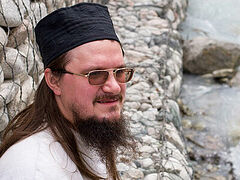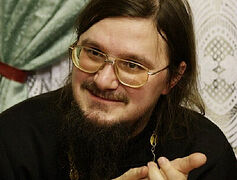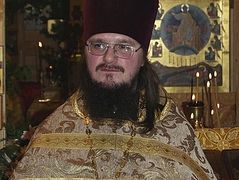This reflection about the martyred Fr. Daniel Sysoev was first published the day after he died, on November 21, 2009.
 Photo: classicalchristianity.com Such news seeps in viscously and persistently: First you can’t understand what you’re reading. It slips away the second and third time; you pull the name from your memory, hoping it doesn’t match; then you grasp at every news hook, spending the night going from one news site to another, not in search of a journalistic error or refutation, but out of helplessness and disarray.
Photo: classicalchristianity.com Such news seeps in viscously and persistently: First you can’t understand what you’re reading. It slips away the second and third time; you pull the name from your memory, hoping it doesn’t match; then you grasp at every news hook, spending the night going from one news site to another, not in search of a journalistic error or refutation, but out of helplessness and disarray.
It was strange looking at people in the metro in the morning—they’re hurrying off somewhere, immersed in their own business, and Fr. Daniel was killed—today, right nearby. It’s terrible for us who have been orphaned to look at how life goes on, boiling, seething, when, in the words of the Patriarch, a “challenge to God’s law” has been cast.
Fr. Daniel was known for his active missionary work among Muslims, his conversion of Tatars to Orthodoxy, discussions about creationism, debates with Muslims, an extensive polemic online about patriotism and “uranopolitism.”1 This is how he might be remembered by those who didn’t know him personally: fiery and argumentative, with often polemical opinions not always shared by his brethren.
But one entry flashed in the news feed and became the most important, illuminating everything. It was about a debate between the Orthodox and Muslims. In this snippet, the words, quotes, names, or gestures weren’t important. Why couldn’t this priest live peacefully? Why not just the services, Sacraments, Sunday School once a week, weekends, wife, children, their problems, restoring a church? What drew him to the debate; why go to faraway Kyrgyzstan; why found a school for street missionaries? Why, in the end, did he have to stay at church so late on that terrible Thursday? Why not go home and rest from the labors of the day?
He was talking about Christ. He wasn’t the kind of person for whom Christianity is regulated in time and space. He was entirely occupied with preaching Christ, salvation, life after death. His last book was about death. So great was his need to missionize, to reach out to people with a word about Christ, to preach on the street, in church, in missionary groups, to Muslims, that he wasn’t deterred by the critical reception of some of his generalizations or by threats. He wasn’t afraid and wrote much about martyrdom as the highest blessedness: “Everything’s in God’s hands. And if it happens, you go immediately to Paradise, without passing through the toll houses—how wonderful!”
Those people running around in the metro aren’t some abstract and impious “they”—they’re all of us. The only difference is that this news struck some of us for a few minutes, others for a few days. What unites us is much more important—we don’t remember what we live for. Fr. Daniel knew it with his whole life, when his name was called out,2 going out to meet a man with a gun that had already been fired once. The life of the young priest was fulfilled at that moment, having reached the final earthly point and the highest fullness.
“The path of service to Christ and His Church is always connected with confession and even martyrdom,” the Patriarch said. How fearful is this word “always.” Such Christianity frightens us; we understand a Christianity with church once a week, fasts four times a year (oh, and it’s very healthy), church friends, round tables and conferences, Orthodox forums and shops, lovely books, silk prayer ropes, and pilgrimage tours. What would we say if an armed man asked us about our faith in Christ? Those whom Fr. Daniel couldn’t reach during his lifetime might wake up a little thanks to his tragic and glorious death. We have to wake up from this deaf vacuum, from which it’s not easy to escape.
Every time a priest is killed, we all feel it sincerely and deeply; we repost about it, we forward the message, we tell friends, we even weep. But how many times Fr. Daniel wrote about threats in his Live Journal, and none of us took any of these entries seriously. We’re completely immersed in the information flow and information vacuum, with the “one thing needful” disappearing into its abyss. We skimmed over his lines about threats with the same empty eyes that we saw today in that morning crowd, we shrugged our shoulders and went off to argue about the salvation of the unbaptized and uranopolitism. There’s not a single comment on Fr. Daniel’s entries about threats that offer any help, or at least ask about it—just wishes of God’s help and salvation.
These wishes came true. Fr. Daniel was killed on the Patriarch’s birthday, on the eve of the feast of the Archangel Michael and All the Heavenly Bodiless Powers, when we read the following Gospel passage in church: Be not afraid of them that kill the body, and after that have no more that they can do. But I will forewarn you whom ye shall fear: Fear him, which after he hath killed hath power to cast into hell; yea, I say unto you, Fear him. Are not five sparrows sold for two farthings, and not one of them is forgotten before God? But even the very hairs of your head are all numbered. Fear not therefore: ye are of more value than many sparrows. Also I say unto you, Whosoever shall confess Me before men, him shall the Son of Man also confess before the angels of God: But he that denieth Me before men shall be denied before the angels of God (Lk. 12:4-9). The best confirmation that the death of Fr. Daniel was without shame and that his answer before the Lord was good was the demonic frenzy of the atheist communities online…
Who will continue Fr. Daniel’s work today? It’s not just a question of teaching in a missionary school or talking about faith. We, who couldn’t and probably didn’t want to intercede, are now responsible for continuing this work, and having broken out of the information vacuum—for remembering the purpose of life, remembering Christ. We have to learn to walk before the eyes of God, so as to give an answer for every word; so as not to utter a formal, “Help me, Lord,” where help is needed; so our lives might not be silent about Christ; so it might not be fearful to stand before the Lord.




